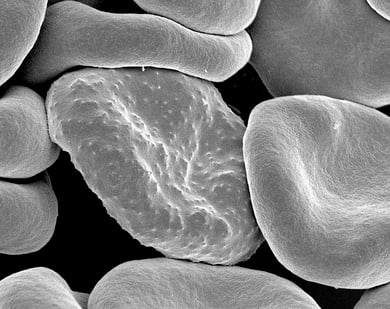Malaria and toxoplasmosis are caused by different, yet closely related, apicomplexa parasites. Efforts to eliminate these diseases have met with only partial success. Now the National Institute of Health (NIH) has awarded the University of South Florida (USF) a $2.5 million, five year grant to study a new approach to fighting these diseases by stopping their ability to replicate.
 (Image of infected red blood cell courtesy of Rick Fairhurst and Jordan Zuspann via Wikimedia Commons)
(Image of infected red blood cell courtesy of Rick Fairhurst and Jordan Zuspann via Wikimedia Commons)
Malaria Facts According to the Center for Disease Control:
- About 1,500 cases of malaria are diagnosed in the United States each year. The majority of these cases are people who have traveled to other countries where malaria is common.
- There have been 63 outbreaks of locally transmitted malaria in the U.S. since the 1950’s. These outbreaks occur when mosquitoes become infected by biting persons carrying malaria parasites.
- In 2015 malaria caused 438,000 deaths worldwide and 3.2 billion people live in areas at risk of malaria transmission.
- Symptoms for uncomplicated malaria are similar to the flu; however, a medical exam may reveal mild jaundice and enlargement of the liver or spleen.
- Severe malaria occurs when the infection is complicated by organ failure. Blood or metabolism abnormalities can also occur. This may lead to neurologic issues, severe anemia and kidney failure.
Toxoplasmosis Facts According to the Center for Disease Control:
- Toxoplasmosis is a leading cause of death from foodborne illness in the U.S. It is contracted from soil contaminated with cat feces, undercooked meat, and congenital transmission.
- Healthy people who become infected with Toxoplasma gondii often do not have symptoms because their immune system usually keeps the parasite from causing illness.
- Any illness is usually mild with "flu-like" symptoms. However, the parasite remains in an inactive state and can become reactivated if the person becomes immunosuppressed.
- The greatest danger from toxoplasmosis is to those with suppressed immune systems and to unborn babies.
- If a woman becomes newly infected while pregnant or just before pregnancy, she can pass the infection to her unborn baby, resulting in a miscarriage, a stillborn child, or a child born with an enlarged or abnormally small head.
How USF researchers hope to defeat these parasites:
The NIH grant will allow Dr. Elena Suvorova, USF researcher at their College of Public Health, and Distinguished USF Health Professor Dr. Michael White of the Department of Global Health to study the DNA licensing of apicomplexa parasites. A licensing factor is a protein or complex of proteins that allows DNA replication to begin at that site. Apicomplexan parasites control DNA replication far differently than humans do. Understanding this process may be the key to preventing diseases like malaria and toxoplasmosis. Their goal is to find new drugs for targeting the parasites that cause these diseases.
“We’re trying to understand the general mechanisms that help parasites to divide,” Suvorova said in an article for the USF College of Health News site. “We’re using the model system of Toxoplasma gondii, which is a close relative of the malaria parasite...Many things that you can easily do in Toxoplasma gondii, you can’t do or it takes much longer to do in Plasmodium spp.,” she explains. “We’re looking for something essential for the parasite’s survival. In this case, it’s DNA replication.”
Bioresearch Event at the University of South Florida
|
RELATED ARTICLES: University of South Florida to Participate in $150M Research Program Texas Medical Center Researchers Closer to Cause of Huntington's |
The University of South Florida currently, USF has $100.7 million in active funding from the National Institutes of Health. Research departments at the University receiving substantial amounts of this funding include:
- Pharmacology - $19.4 million
- Medicine and Internal Medicine - $13.3 million
- Public Health and Preventative Medicine - $8.9million
- Ophthalmology - $6.1 million
- Biochemistry - $5.5 million
On February 9, 2017 Biotechnology Calendar, Inc. will host the 2nd Annual BioResearch Product Faire™ Event at the University of South Florida. This event provides laboratory suppliers with the opportunity to market products to active, highly-funded Tampa area researchers in search of the best new tools to further their research.
Lab suppliers interested in learning more about this upcoming, premiere lab product event are invited to visit the following link to learn more about the February event.
Science professionals in the local area are invited to participate. . Visit the following link in order to preregister ( no cost for science professionals).




